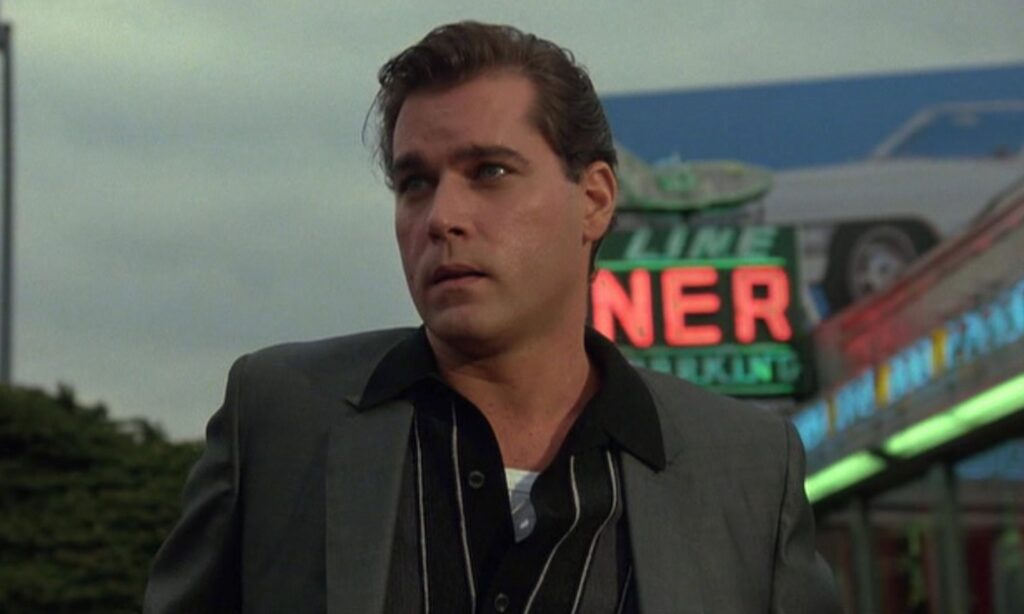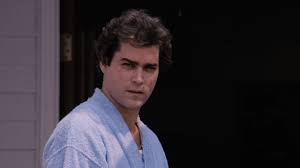
Any appraisal of Ray Liotta must, of course, begin with Goodfellas.
And it wasn’t even the role he was born to play; he had to earn it, had to convince the powers that be that he was the guy. He saw it, he knew, and he went and got it. It’s hard to think of a better distillation of his persona, on-screen and off: a scrapper from the old school, what we would have once called a “man’s man” without being political or ironic.
One of the reasons Liotta, as Henry Hill, is so indelible is this particular antihero himself was so demonstrably human his story required an actor who was an authentic human being; who couldn’t (who wouldn’t) conceal the humanity he brought to bear in every performance. Thus, we see and understand Hill as underdog, thug, gentleman, poser, schemer, coward, opportunist, and finally, realist (“I’m an average nobody, I get to live the rest of my life like a schnook”).
(A lot more on the film I not so humbly described as the most definitive American movie of the last three decades, here. Quick recap: Moral of the story? Crime doesn’t pay, except when it does (and even if it never does, it’s better than a day job). At the beginning of the film, Henry claims “as far back as I can remember I always wanted to be a gangster.” The tragedy of his life is not that he became one; the tragedy is that as the movie ends, and Henry stands in the (relative) safety of his suburban lawn, he still longs to be one.)
It’s possible that the ostensibly risky casting of Liotta (the studio imbeciles, in their eternal anti-wisdom, wanted Tom Cruise—stop and think about that for a second, and then let’s move on, as quickly as possible) made more sense to those of us already familiar with him. See, it really begins with Something Wild, Liotta’s breakout role. Speaking of perfectly cast movies that have aged exceedingly well, this minor masterpiece from Jonathan Demme—among its many rewards, including a next-world soundtrack and unfiltered street scenes of a pre-‘90s NYC that can almost be appreciated as documentary—will always warrant props for introducing Ray Liotta, soaked in grease and shot out of a machine gun, as Ray Sinclair.
Do you remember the first time you saw Something Wild? If you came to it late, I’m sure it made an impression, but taking this in, in real time (circa 1986), without any context? There are not enough accolades for Liotta’s performance: he’s genuinely terrifying (and by all accounts, he actually was a gentle, if gruff, guy; so, unlike say, a real tough guy like James Caan, this was actual acting), but he’s also funny, smart, and definitely weird. Wired, actually, like most misfits, differently: unable to neatly fit into a world requiring rules, they exhaust themselves—and everyone else—trying and failing to restructure reality to meet their impossible needs.
He’s never not on screen in support of the stars (Jeff Daniels and Melanie Griffith), but Liotta owns every second in which he’s featured. Exhibit A: here’s where we first fully grasp the real danger bubbling below the surface, boiling in the classic sociopath’s stew of charm and insincerity (check out Sinclair’s facial expression at the very end of this clip: how it changes as he exits the car and, oh so briefly, looks back and the mask drops. Things are about to take a very dark and definitive turn).
After Goodfellas, Liotta became the rare actor who, no matter how horrid the material, shined on screen. His whole vibe, however cultivated—intense, taciturn, offbeat, capable of sudden and extreme violence—could only work in celluloid; in an office or happy hour gathering this guy would repel company, but on film everything clicked. Take Cop Land, another (very minor) epic chock-full of superstars, stuffed in like sardines and fighting to the death for every inch of turf: Liotta crushes every scene, and his supremely flawed and suffering character could not have plausibly been played by anyone else. (To be clear: Figgsy is intended to be the moral center of this tale, but it’s easy to imagine so many other actors fumbling with this role, chewing scenery instead of laying it all out on the aesthetic line; it was impossible for Ray to not be real.)
That Liotta seemed comfortable, even compelled to play complicated, inscrutable characters seems less a calculated choice than his recognition that he couldn’t be a polar bear feigning contentment in the Sahara. Ever seen an interview with him? He may not have been what he made us believe when the cameras rolled, but it’s undeniable he was bringing elements of himself to each successive performance. More, there’s a curious bravery—especially in an era where even a celebrity’s personal trainer can be a celebrity—in being not only willing, but a bit obsessed with allowing oneself to be ugly in the service of verisimilitude.
Note I’ve not said anything about Field of Dreams. It’s okay, everyone else will, and I’d prefer to focus on another minor masterpiece that has never generated the accolades it deserves: Narc (from 2002). It would be at once reductive and lazy to suggest Henry Oak is a gritty distillation of Ray Sinclair, Henry Hill, and Shoeless Joe Jackson but…well, Oak is haunted (by the death of his wife, the death of his partner, the death of his faith in life), Oak is angry, Oak is capable of shocking violence, Oak is in such visible pain we can practically see it spreading across his body like rust on a discarded warehouse. Oh, and Oak’s a hero—a misunderstood, unsupported one, at that. It’s a performance innumerable actors would kill to deliver, and one that exactly zero other actors would qualify for. This, if nothing else, is one handy definition for originality and a life richly lived.
Any appraisal of Ray Liotta must, of course, conclude with Goodfellas.
That role, that film, the cultural touchstone that launched a thousand imitations, at once an exercise in nostalgia and prescience, cramming seemingly every human vice, aspiration, joy, and self-inflicted calamity; Shakespeare with guys in silk suits beating, betraying, killing, and mostly loving each other. And for this contemporary myth—equal parts fable and morality tale—to work it had to be sold by a narrative guide who we believed had seen the things he’s showing us, a man incapable of not being truthful, even when he was lying. Especially when he was only pretending.

